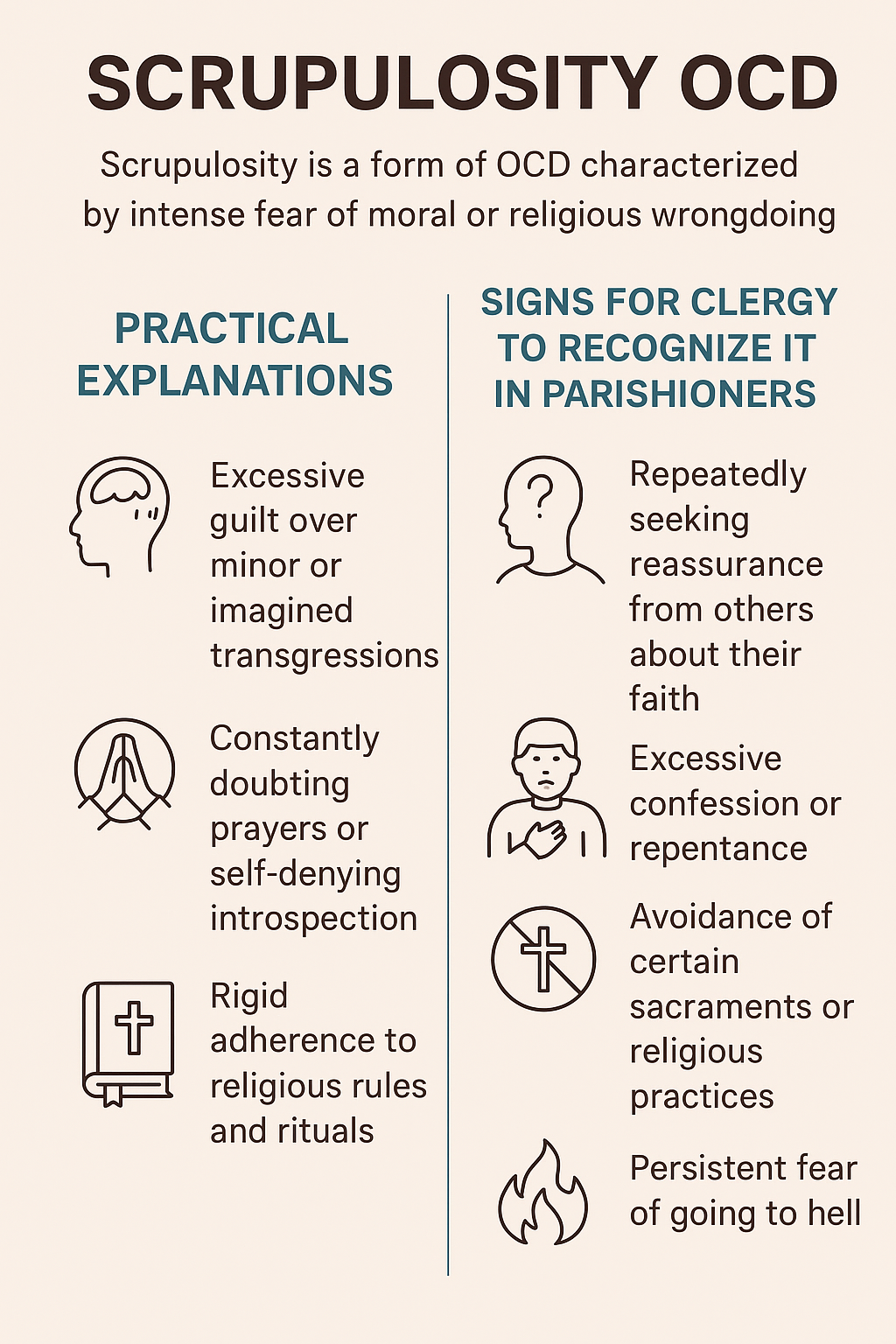Never Good Enough: The Exhaustion of Scrupulosity OCD
Living with scrupulosity OCD often feels like being trapped in a never-ending cycle of fear, doubt, and guilt. This subtype of obsessive-compulsive disorder centers on religious, spiritual, and moral concerns. Instead of finding comfort in faith or values, individuals feel constantly judged, never pure enough, and endlessly anxious about sinning or failing God.
What Is Scrupulosity OCD?
Scrupulosity OCD, sometimes called religious OCD or moral OCD, involves obsessive fears about moral failure and compulsive attempts to avoid sin or wrongdoing. These compulsions may include:
Repeating prayers until they feel “perfect” or “just right”
Avoiding certain places, people, or media in an attempt to prevent the possibility of sinning
Confessing thoughts or actions repeatedly to religious leaders
Overanalyzing thoughts and intentions to prove they are “pure”
Seeking constant reassurance from clergy, friends, or family
Instead of deepening faith and empowering the individual to live out their values, scrupulosity becomes a mental health disorder fueled by doubt and fear.
The “Never Good Enough” Trap
The hallmark of scrupulosity is the belief that no matter how much you repent, confess, or practice, you’ll never be good enough. What complicates things is that certain religious environments may even perpetuate this self-belief by over-emphasizing theological doctrines such as the doctrine of original sin. For many, this leads to:
Spiritual exhaustion
Religious trauma symptoms
Isolation from their faith community
Ongoing anxiety, guilt, and shame
The tragedy is that faith traditions are meant to offer peace and connection, but with scrupulosity OCD, they can become sources of constant fear. There’s an ever-present reminder to this individual that they are a failure, which deeply damages their self-concept.
How Scrupulosity OCD Shows Up in Different Religions
Because it’s primarily a mental health concern, scrupulosity is not limited to one religion. It can appear in almost any tradition where rules, rituals, or moral codes are emphasized. Here are some examples:
Catholicism: A Catholic with scrupulosity OCD may obsessively go to confession multiple times a week, terrified that they missed a sin or confessed incorrectly. They may say extras Hail Marys, but never feel like they’ve done enough.
Islam: A Muslim with scrupulosity may spend hours repeating wudu out of fear it wasn’t done “purely” enough before prayer.
Church of Jesus Christ of Latter-day Saints: A member may excessively worry about temple worthiness interviews, replaying every possible mistake to prove themselves righteous.
Evangelicals: An evangelical Christian with scrupulosity OCD may constantly wonder if they are truly saved, endlessly re-praying the sinner’s prayer to make sure their salvation is solid. They may fear they’re just lying to themselves about their commitment to Christ.
Christian Fundamentalists: Someone raised in fundamentalist Christianity might obsess over modesty, purity, or thought sins, fearing even a fleeting “bad thought” could send them to hell.
Baháʼí Faith: A Baháʼí struggling with scrupulosity might feel relentless pressure to live up to ideals of unity, peace, and moral perfection, becoming hyper-vigilant about never failing their community.
Buddhism: A Buddhist with scrupulosity OCD may fear they are accumulating bad karma with every stray thought or minor action, obsessively trying to meditate “perfectly” or avoid unskillful acts.
In every case, the pattern is the same: rules and practices meant to guide and nourish the human soul become distorted into obsessive cycles of fear and compulsive behavior.
Breaking Free from Scrupulosity OCD
Healing begins when people realize that what they’re experiencing isn’t a lack of faith; it’s a mental health condition. Treatment approaches like:
Exposure and Response Prevention (ERP), the gold-standard OCD therapy
Acceptance and Commitment Therapy (ACT) for religious OCD (This is my personal go-to method, especially for treatment-resistant symptoms!)
Trauma-informed therapy for those experiencing religious trauma
Self-compassion and mindfulness practices
These methods can help reduce the hold of obsessive fear and allow people to reconnect with their values in an empowering way.
Final Thoughts
Scrupulosity OCD is exhausting. It convinces people they’re never pure enough, never faithful enough, and never safe from sin. The truth is that you are not broken; you’re struggling with a treatable mental health condition. By naming scrupulosity for what it is, seeking therapy, and giving yourself permission to rest from constant striving, you can step out of the “never good enough” trap and begin to experience peace again.
Scrupulosity OCD is a type of Obsessive-Compulsive Disorder where religious or moral obsessions create significant distress. It is not a reflection of weak faith, but rather a mental health condition. Signs clergy may notice in parishioners include excessive confessions, repetitive prayers intended to “cancel out” intrusive thoughts, constant reassurance-seeking about sin or salvation, and overwhelming fear of punishment or hell. Practical explanations for clergy include understanding that scrupulosity is driven by anxiety, not lack of devotion, and that excessive rituals are compulsions, not evidence of stronger faith. Support should involve empathy, gentle redirection, and encouragement to seek professional help from a licensed therapist.
Jehovah’s Witnesses: A Jehovah’s Witness struggling with scrupulosity may fear they’ve accidentally violated their morals by acknowledging a birthday or holiday (i.e. getting too close to celebrating it) leading to a constant fear over being disfellowshipped and losing their loved ones.
